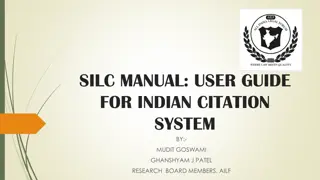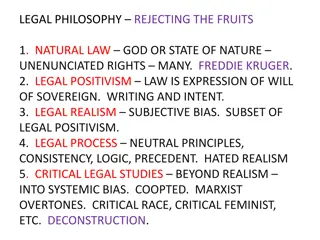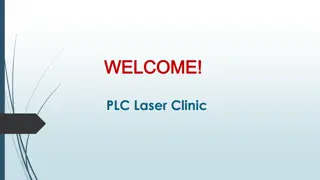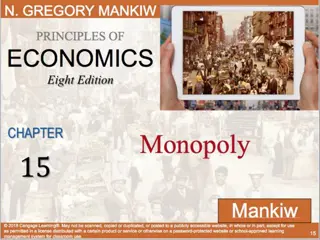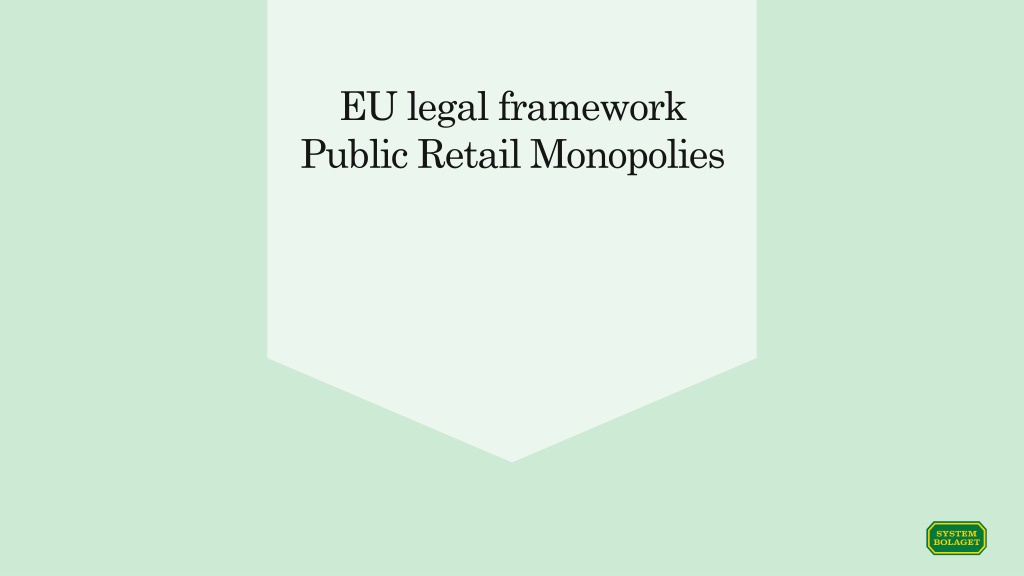
Understanding EU Legal Framework for Public Retail Monopolies
Explore the EU legal framework governing public retail monopolies, focusing on the Nordic Approach and the Treaty on the Functioning of the European Union. Learn about the regulations, scrutiny under Articles 34 and 37 of the TFEU, and the principles guiding the operation of public monopolies within the EU.
Download Presentation

Please find below an Image/Link to download the presentation.
The content on the website is provided AS IS for your information and personal use only. It may not be sold, licensed, or shared on other websites without obtaining consent from the author. Download presentation by click this link. If you encounter any issues during the download, it is possible that the publisher has removed the file from their server.
E N D
Presentation Transcript
EU legal framework Public Retail Monopolies
Introduction A country s drinking culture is strongly associated with its history. The corollary is that countries use different approaches to limit the harmful effects of alcohol. The Nordic countries, which share similar drinking cultures, have chosen to implement a set of measures that have proven successful in their context. These include taxation, marketing restrictions as well as state-owned retail monopolies to reduce availability. We call this mixture of policies and actions the Nordic Approach. Although they differ on both a regulatory and policy level, they are similar in structure and there is a clear consensus on the role and overall goal of the Nordic approach. 2025-03-20 2
Context Taking it from an EU perspective what does the EU law say about public monopolies? For a member statae to have a public monopoly is in clear contrast to the founding principles of EU (the Internal Market and Free Movement of goods etc). Without going into the history to much both Sweden and Finland had public monopolies before joining the EU and were allowed to keep them under certain conditions derived from article 37 TFEU. Worth noting, public health- and alcohol policy is considered a national competence in the European Union (but not the products as such). Each member state is thus free to design its own alcohol policy in the manner it finds most appropriate, provided that the policy is compatible with EU law. The Nordic monopolies have nothing to do with protecting domestic markets, and that the monopoly aspect only applies to the way in which the products are sold. It should also be underlined that the Nordic monopolies are legally obliged to operate in accordance with the principles of non-discrimination, objectivity and transparency. In practice, this means that product selection, product range, and the conditions under which products are sold offer no advantage or disadvantage to any one product or brand. 2025-03-20 3
Treaty on the Functioning of the European Union (TFEU) 2025-03-20 4
Measure/actions taken by a monopoly may be examined either under Art 34 or Art 37 TFEU Article 34 is stricter than article 37 according to case law under article 34, any measure that has the risk of complicating access to the market is considered an illegitimate trade barrier, even if there s no discrimination. (e.g. product conditions may be applied equally for all products regardless the origin but may still be in breach of article 34 TFEU) Measures and actions which fall under article 37 TFEU is subject to a less strict assessment. A violation of article 37 TFEU is concluded only if goods from other member states are discriminated or put at a disadvantage in law or in fact. Article 37 is exclusive and not cumulative applied in relation to article 34 meaning if an action taken by the monopoly falls under the scope of article 37 and is considered to be compatible with that provision no examination is done under article 34. Article 37 TFEU applies to the existence and operation of the monopoly. Rules that affect the monopoly without regulating its existence and operation fall outside the scope of article 37 and is instead examined under article 34 TFEU. E.g. the former prohibition of private import of alcohol beverages to Sweden, was considered affecting the monopoly but didn t relate to the existence and operation of the monopoly (Rosengren). 2025-03-20 5
The admissibility of public monopolies (EU law foundation) Public monopolies on goods are considered illegitimate trade barriers (e.g. import monopolies) When it comes to public retail monopolies member states may keep them as long as they adjust them in such a way that they don t discriminate when it comes to the conditions under which the goods are procured and marketed article 37 TFEU (C-189/95, Franz n) (Article 37.1 has direct effect (it can be invoked by individuals or companies in court)) Non-discriminatory principle (art 37 TEFU) organization and operations of the monopoly must be arranged so that domestic products or producers are not put at an advantage or that the competition between member states are distorted. Article 37 requires the member states to ensure that there are structural safeguards in place for non- discrimination. This means that a retail monopoly has to be transperent so that suppliers and producers can control unlawful disadvantage. (Hanner) 2025-03-20 6
Franzn(C-189/95) - The leading court case from the ECJ for when it comes to how retail monopolies are to operate Background Grocery store owner Harry Franz n challenged the monopoly as soon as Sweden had become an EU member. Bought wine from Systembolaget and sold it in his own grocery store on January 1st 1995. Called media and even the police to come so that a legal process could start as soon as possible. Eventually came all the way to the ECJ. Conclusion The Swedish retail monopoly Systembolaget was allowed its methods for product selection, retail sales network and marketing didn t put imported goods from other member states at a disadvantage in law or in fact . The ECJ took into consideration the public interest of Systembolaget, which accoridng to the Court was to protect public health against the harm caused by alcohol. 2025-03-20 7
Existence and operations of the monopoly Actions taken by the retail monopoly are assessed either according to article 37 or article 34. Article 37 applies to the existence and operations of the monopoly. According to case law, the existence and operations of the monopoly equals the exercise of the monopoly s exclusive rights (system for product selection, sales network, sales, promotion) System for product selection the criteria and selection methods used cannot be either discriminatory or apt to put imported products at a disadvantage Systembolaget: product selection is driven by consumer demands, objective requests for tenders irrespective of product origin (strict on meeting formalities), offers selected on quality and correspondence to the tasting profile in the request) The monopoly s sales network even if the retail network of Systembolaget is imperfect, this circumstance does not adversely affect the sale of alcoholic beverages from other Member States more than the sale of alcoholic beverages produced in Sweden (Systembolaget to ensure that each commune which so wishes has a sales outlet and that all points of the territory are served at least by dispatch deliveries.) 2025-03-20 8
Sales in physical stores or online, must be objective and not favor a particular product over another (staff in stores should e.g. always advice on at least three different products as part of the selling). Promotion of alcoholic beverages The rules on promotion and publicity should apply equally to national and other Community products. They should not constitute a hidden preference for national products. Apply strictly equal conditions for the promotion of products Other national regulations or restrictions on the promotion of alcoholic beverages to the public As far as product promotion is concerned, the agreement made between the Swedish State and Systembolaget requires the latter to adopt marketing and advertising measures which are impartial and independent of the origin of the products and to endeavor to make known new beverages to consumers whilst taking account of the restrictions in the Law on Alcohol. The method of promotion used applies independently of products' origin and is not in itself apt to put at a disadvantage, in fact or in law, beverages imported from other Member States in relation to those produced on national territory. 2025-03-20 9
2025-03-20 10
Art 102 TFEU Dominant position If a certain action taken by the monopoly falls outside the scope of article 37 it may still fall under the competition rules, in particular abuse of a dominant position (article 102 TFEU). It goes without saying that a monopoly has a dominant position on a market. Systembolaget with its exclusive right on the retail market both on sales and purchases for resale. To operate in a non-discriminatory way means for Systembolaget to have 1) objective rules regarding the purchase and sales of alcoholic beverages; 2) which will be applied equally to every Community Citizen and Community product and 3) which are transparent. EU Competition rules regarding abuse by undertakings of a dominant position impose an obligation for dominant undertakings not to abuse its dominant position, e.g. applying dissimilar conditions to equivalent transactions with other trading parties, thereby placing them at a competitive disadvantage. A certain action may be considered a competitive discrimination. The question asked here is if dissimilar conditions are applied to equvialent situations placing a trading partner at a competitive disadvantage (and not discrimination between different member states). The measure is thereafter assessed to find out in which way the measure was designed to see if it may be justified on the basis of objectively acceptable reasons (proportionate). 2025-03-20 11






